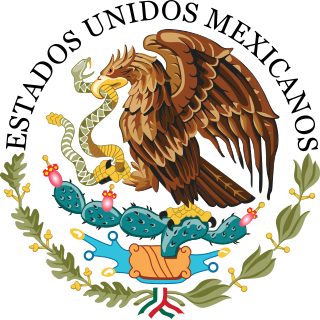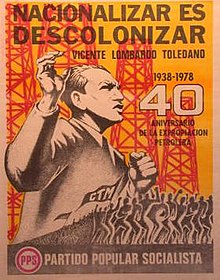
The politics of Mexico function within a framework of a federal presidential representative democratic republic whose government is based on a multi-party congressional system, where the President of Mexico is both head of state and head of government. The federal government represents the United Mexican States and is divided into three branches: executive, legislative and judicial, as established by the Political Constitution of the United Mexican States, published in 1917. The constituent states of the federation must also have a republican form of government based on a congressional system as established by their respective constitutions.

The Institutional Revolutionary Party is a political party in Mexico that was founded in 1929 and held uninterrupted power in the country for 71 years, from 1929 to 2000, first as the National Revolutionary Party, then as the Party of the Mexican Revolution and finally as the PRI beginning in 1946.

Cuauhtémoc Cárdenas Solórzano is a civil engineer and prominent social-democrat Mexican politician. The son of 51st President of Mexico Lázaro Cárdenas, he is a former Head of Government of Mexico City and a founder of the Party of the Democratic Revolution. He ran for the presidency of Mexico three times, and his 1988 loss to the Institutional Revolutionary Party candidate Carlos Salinas de Gortari had long been considered a direct result of obvious electoral fraud perpetrated by the ruling PRI, later acknowledged by President Miguel de la Madrid. He previously served as a Senator, having been elected in 1976 to represent the state of Michoacán and also as the Governor of Michoacán from 1980 to 1986.

The Party of the Democratic Revolution is a social democratic political party in Mexico. The PRD originated from the Democratic Current, a political faction formed in 1986 from the Institutional Revolutionary Party (PRI). The PRD was formed after the contested general election in 1988, which the PRD's immediate predecessor, the National Democratic Front, believed was rigged by the PRI. This sparked a movement away from the PRI's authoritarian rule.

Vicente Lombardo Toledano was one of the foremost Mexican labor leaders of the 20th century, called "the dean of Mexican Marxism [and] the best-known link between Mexico and the international world of Marxism and socialism." In 1936, he founded the Confederation of Mexican Workers (CTM), the national labor federation most closely associated with the ruling party founded by President Lázaro Cárdenas, the Party of the Mexican Revolution (PRM). After he was purged from the union after World War II, Lombardo Toledano co-founded the political party "Partido Popular" along with Narciso Bassols, which later became known as the Partido Popular Socialista.
Fidel Velázquez Sánchez was the preeminent Mexican union leader of the 20th century. In 1936 he was one of the original founders, along with Vicente Lombardo Toledano, of the Confederation of Mexican Workers (CTM), the national labor federation most closely associated with the ruling party, the Institutional Revolutionary Party (PRI). He replaced Lombardo as the leader of the CTM in 1941, then expelled him from it in 1948. He led the CTM, which grew increasingly corrupt and conservative, until his death in 1997.

The Confederation of Mexican Workers is the largest confederation of labor unions in Mexico. For many years, it was one of the essential pillars of the Partido Revolucionario Institucional, which ruled Mexico for more than seventy years. However, the CTM began to lose influence within the PRI structure in the late 1980s, as technocrats increasingly held power within the party. Eventually, the union found itself forced to deal with a new party in power after the PRI lost the 2000 general election, an event that drastically reduced the CTM's influence in Mexican politics.

The Authentic Party of the Mexican Revolution was a Mexican political party that existed from 1954 to 2000. For most of its existence, the PARM was generally considered a satellite party of the governing Institutional Revolutionary Party (PRI).

Popular Socialist Party of Mexico is a communist party in Mexico, formed in 1997 after a split from the Popular Socialist Party (PPS).

The Mexican Communist Party was a communist party in Mexico. It was founded in 1917 as the Socialist Workers' Party by Manabendra Nath Roy, a left-wing Indian revolutionary. The PSO changed its name to the Mexican Communist Party in November 1919. It was outlawed in 1925 and remained illegal until 1935, during the presidency of the leftist Lázaro Cárdenas. The PCM saw in the left wing of the nationalist regime that emerged from the Mexican Revolution a progressive force to be supported—i.e. Cárdenas and his allies. In the end, the PCM disappeared after helping form the Party of the Democratic Revolution, a split from the PRI led by the son of Lázaro Cárdenas, Cuauhtémoc Cárdenas.

The Unified Socialist Party of Mexico was a socialist political party in Mexico. It later became the Socialist Mexican Party in 1988.

The Socialist Mexican Party was a left-wing Mexican political party, and one of the immediate antecedents of the present Party of the Democratic Revolution. It was the last effort to unify the different Mexican left-wing parties, as well as the last political party in the country to officially use the word "socialist" in its name. It existed between 1987 and 1989.
Marcela Lombardo Otero was a Mexican politician, daughter of the leftist Vicente Lombardo Toledano, founder of the Popular Socialist Party. She was a deputy during the L and LIV Legislatures, from 1976 to 1979 and 1988 to 1991. In the 1988 election, she was the only female candidate from any of the parties that formed the FDN to win her seat in congress by majority.

The “National Democratic Front” was a coalition of Mexican left-wing political parties created to compete in the 1988 presidential elections, being the immediate predecessor of the Party of the Democratic Revolution (PRD). It was result of an agglutination of small political left and center-left forces with dissident members from the Institutional Revolutionary Party (PRI). Their candidate for the presidential election was Cuauhtémoc Cárdenas.
The Movement of National Liberation (MLN) was a Mexican leftist political party composed of numerous socialist, Marxist, and peasant activist groups. They operated primarily between 1961 and 1964.
Narciso Bassols García was a Mexican lawyer, socialist politician, ambassador to France, the Soviet Union, and the United Kingdom, and professor of law at the National University of Mexico. He co-founded the Popular Party, and the League of Political Action. Bassols is most noted for his role in socializing the country's public education system.

General elections were held in Mexico on 7 July 1952. The presidential elections were won by Adolfo Ruiz Cortines, who received 74.3% of the vote. In the Chamber of Deputies election, the Institutional Revolutionary Party won 151 of the 161 seats. These were the last presidential elections in Mexico in which women were not allowed to vote.
The Mexican People's Party was a political party in Mexico, founded in 1977. PPM was led by Alejandro Gascón Mercado. PPM was mainly based in the Nayarit and Jalisco states.

Miguel Henríquez Guzmán was a Mexican politician and military officer. He challenged the official candidate of the Institutional Revolutionary Party for the presidency in 1952.

The Workers' Socialist Party was a socialist political party in Mexico. The PST was founded in 1975 by Rafael Aguilar Talamantes, Graco Ramírez and Juan Ignacio del Valle, though the party did not obtain its official registration until 1979. The party nominated Cándido Díaz Cerecedo in the 1982 presidential election.
















